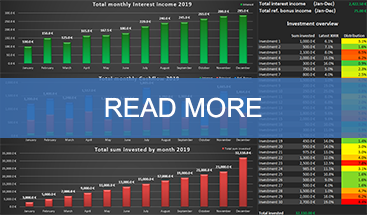Crowdlending, which is also described as peer-to-peer (P2P) lending, is a form of Internet-based lending in which loans are usually offered by a number of private individuals to other private individuals or to organizations. The 2 sides find each other on what is known as online credit market locations. Credit applicants provide their projects that need funding on the market locations, and loan providers (financiers) get a chance to purchase them.
What are click here all about

The market place operators charge the customers and often also the financiers a cost for their mediation services. Those who require funding can send a loan on a provider’s site. While doing so, they have to offer different pieces of info on their personal and monetary scenario, which allows evaluation of their credit reliability as part of a credit check. The resulting credit ranking shows the default threat for the financier and is a key factor in identifying the rate of interest.
If the credit decision is favorable, the credit project exists to possible loan providers on the online market place. To purchase credit projects, lending institutions need to go through a reasonably uncomplicated registration procedure on the provider’s platform. Once the platform operator has effectively validated their identity, they can begin investing quickly.
Possibly you wish to support your regional area/country. State you reside in a nation where banks are dealing with clients unjustly. Possibly they do not provide loan to upstarts or to very first time home purchasers. State you wish to assist regional organization bypass the banks, so you invest through a platform that permits the small company to provide loan at sensible rates. Not all financiers are mostly in it for the monetary gains. Sure, the cash is an excellent advantage, however other aspects might matter.
Risks associated with crowdfunding
Just like all forms of financial investment and funding, crowdlending also includes particular threats. If the borrower defaults, the financier is threatened, in a worst-case situation, with the loss of his/her whole financial investment. Financiers ought to also keep in mind that debtors may be late in meeting their payment commitments in specific situations or that they may want to settle the loan early if possible. Credit candidates, on the other hand, ought to be mindful that the rejection rate of applications for a loan is high which a bad credit ranking can result in high-interest payments. What is more, they are examined by both the crowdlending suppliers and the loan providers, which can involve long waiting periods.
Who is crowdlending appropriate for?
All in all, crowdlending deals private individuals, SMEs and self-employed people a fascinating option to a standard bank loan, allowing them to acquire financing in a (primarily) simple way and at fair conditions. In addition, debtors must know the threats and drawbacks of crowdlending (specifically in relation to personal loans) and take them into account appropriately when examining it as an option. For financiers, crowdlending mainly opens a new source of returns in the current environment of low rates of interest. As is always the case, however: the greater the rate of interest, the greater the danger.

